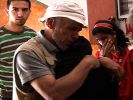Eye For Film >> Movies >> The Do Gooders (2013) Film Review
British director Chloe Ruthven’s personal film refuses to conform to the traditional trajectories of most documentaries. Usually viewers could expect the filmmaker to wrap up the film having achieved a certain state of knowledge and enlightenment, a solution to a problem or an untangling of a mystery. Ruthven’s film suggests some subjects - in this case the seemingly unending Palestine-Israeli occupation and conflict - can overwhelm the searcher, leaving only heartbreak and unanswered questions.
The director’s family history is intertwined with the tragedy of Palestine, as her grandparents were aid workers in the Middle East. Trying to retrace her grandparents' footsteps and see the impact of modern aid in the occupied territories, Ruthven takes her camera to Nablus, Ramallah and Israeli settler towns in the company of the fiery and intelligent local driver and fixer, Lebna.

The resulting documentary charts the increasing fracturing of Ruthven’s assumptions about Western aid to the region, both how it is given and received, and perceived. She finds the place saturated with aid and aid workers, yet none of this seems to be advancing the area at all, merely holding it in stasis for a political solution that never comes. The towns she visits in the occupied territory seem to be full of trust fund volunteers and graduate adventure-seekers on their gap years, planting trees and teaching schoolchildren but achieving little else.
She meets some older Westerners who are not aid workers but instead are attempting to function as amateur journalists and witnesses, travelling around interviewing and photographing the Palestinian survivors of Israeli arrest raids and other actions. But observing this well-intentioned activity begins to make Ruthven feel even more uncomfortable, as if she is merely some kind of useless voyeur. Despite the images of suffering she had seen on TV, she finds Ramallah also has a five-star hotel and plenty of cocktail bars for the aid workers. It is a golden cage, one cynical worker comments in an interview.
When Ruthven meets Lebna and hires her as a guide, it is initially almost a relief to her to hear a local vocalise openly why the internationals are so superfluous in many ways - they are not really joining the struggle but supporting only certain ‘activities’- such as a German funded arthouse cinema in Ramallah which Ruthven finds spectacularly irrelevant. Lebna, who fascinates and intimidates Ruthven in equal measure, sees aid as a politicised tool overwhelming the Palestinians, keeping them dependent and in fear of it being withdrawn.
Lebna constantly pokes and prods, arguing that the director too often sees the situation through a white Western lens. To highlight her argument, in one sequence we see Lebna taking Ruthven away from the aid projects and out to visit a Palestinian farmer working a tough strip of land near the Israeli exclusion wall. The man rants that instead of the West sending him endless bags of bug-infested flour, they should force Israel to return to him the free use of his land which has been largely blocked off. Lubna also takes Ruthven to an Israeli settlement, well provided for with well paved roads, watered gardens and clean sidewalks. "It is apartheid," Lubna sighs as they recline in a local park, adding she had never used that term sincerely until now.
Being part travelogue, part family history, this film should not be approached as a detailed and objective investigation of the decades long Israeli-Palestinian occupation and conflict. The director’s research, and access to high up political figures and institutions dealing with the region, is very limited. Ruthven does attempt to interview the aid director of the United Nations UNERA office, and to meet with the Quartet leader Tony Blair and the Palestinian leadership, but these attempts are brief and stonewalled.
There is no significant screen time given to Israeli voices either. Where the documentary does work well is in its charting of the intriguing dynamic that develops between Ruthven and Lebna, as good Western intentions clash with longstanding local cynicism. Lebna, watching Ruthven flail about in a region she only understands from her grandparents books, alternates between being charming, exasperated and distant. Unlike Ruthven, Lebna does not get the luxury of flying home.
Reviewed on: 17 Oct 2013
















